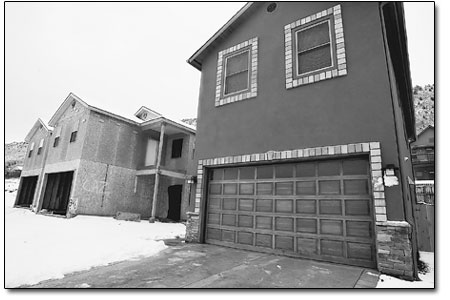| ||
An affordable housing testing ground
by Missy Votel The local affordable housing effort will receive a helping hand over the next few years. La Plata County has been chosen as one of only four recipients of a national nonprofit program that places young architects in communities for the sake of developing and designing affordable housing. The opportunity was made possible through the Fred P. Rose Architect Fellowship, a program of the nonprofit Enterprise Community Partners. The Maryland-based Enterprise helps build affordable housing by offering loans, grants and other community resources. The Rose fellow, Ophelia Wilkins, will be working with the La Plata County Regional Housing Alliance over the next three years, helping to acquire and develop land and design housing. In addition to paying Wilkin’s $42,000 annual salary, the Rose Fellowship will also cover the costs of ongoing training and education related to her position. “To be selected as one of the sites is a huge honor and a huge resource,” said Jennifer Lopez, director of the Regional Housing Alliance. “It’s really going to build on our efforts in a whole new way.” Lopez, who worked with Enterprise during her work in Santa Fe, was instrumental in bringing the Rose fellow to La Plata County. Other sites selected this year were New Orleans, the Bronx, and the farming community of Woodberg, Ore., outside of Portland. She said the selection of La Plata County was a departure for Enterprise, which typically doesn’t work in rural areas. “We’re trying to do something innovative with our model here, and I asked about taking us on as a pilot project,” said Lopez. After a visit to the area, Lopez said Enterprise signed on because they were intrigued by the unexplored possibilities of small, Western “gateway communities” such as Durango. Such areas were historically agricultural but are now feeling the pressures of “being discovered.” “Durango, like many other small towns in the West, went from being rural to a ‘destination place,’ and the impacts have skewed the housing market,” she said. “Part of the attraction for Enterprise was that nobody’s really figured out a comprehensive housing strategy model for gateway communities in the West. They said, ‘We’d really like to try a crack at this.’” As a result, La Plata County will serve as a sort of testing ground for various public-private affordable housing partnerships, she said. In addition to the Rose fellow, Enterprise will also be working with the RHA on establishing a below-market loan fund and possibly provide grants for 2008. However, Lopez said by far, the addition of a third staff member is the best part of the deal. “To have that kind of skill set is going to help us tremendously,” she said. “Our Land Development Plan has basically been on paper but we haven’t had the staff to make it a go.” She said Wilkins will be pivotal in giving the RHA a voice at the table in future development as well as ensuring that all development the RHA is involved in is on the cutting edge of efficiency, green-building standards and quality. It is the latter that is the basis of the Rose Fellowship philosophy, said Katie Swanson, director of the program. Since the program launched in 2000, there have been 26 fellows who have completed 2,500 units, with another 2,500 in the pipes. “We’ve had fellows working in high-market and low-market areas, and even though they’re all working in diverse communities, they share common values that make it work,” she said. Swanson said this includes a belief in enduring design that’s accessible for people of all incomes. “What the Rose Fellowship is really saying is that architecture should be available and beneficial to everyone in the community. Regardless of income, all people should have a beautiful, healthy place to call home.” An important component of this, she said, is the use of energy efficient designs and safe building materials, corners that are often cut in the construction of affordable housing. “Energy efficiency is important because such a high rate of income for poorer families is spent on electricity and heat,” she said. Likewise, when cheaper building materials are used, it can result in adverse health effects. “We find there are often asthma and other health problems from the use of such corrosive materials,” she said. “These architects really believe that architecture needs to serve more people and can be used to improve the lives of low-income people.” Wilkins, an MIT masters graduate who recently moved to Durango from San Francisco, wholeheartedly agrees. For the last several years, she has been working on a number of sustainable building projects, including one that developed straw-bale housing on the Navajo Reservation. “It was my work on the reservation that kept me coming back to the area and interested in the area. I’ve always wanted to live in the Rocky Mountains,” said the Massachusetts native. Wilkins, who will be emtnoring under local archietect Dean Brookie, said she in interested in a variety of green design strategies, from managing water and optimizing solar gain to using nontoxic materials and reducing construction waste. However, she notes that one of the greenest, and unfortunately most cost intensive, green building methods is urban infill. “Not only are you using materials and infrastructure that is already in place, but you’re limiting sprawl and everything that goes with it,” she said. What will be unique and exciting about her new job is that in the past, she worked on prototypes that could be used in a variety of settings for a variety of users. “What I love is that here, I know who is doing the developing and why and for whom,” she said. “It’s important to know who your clientele is.” •
|


